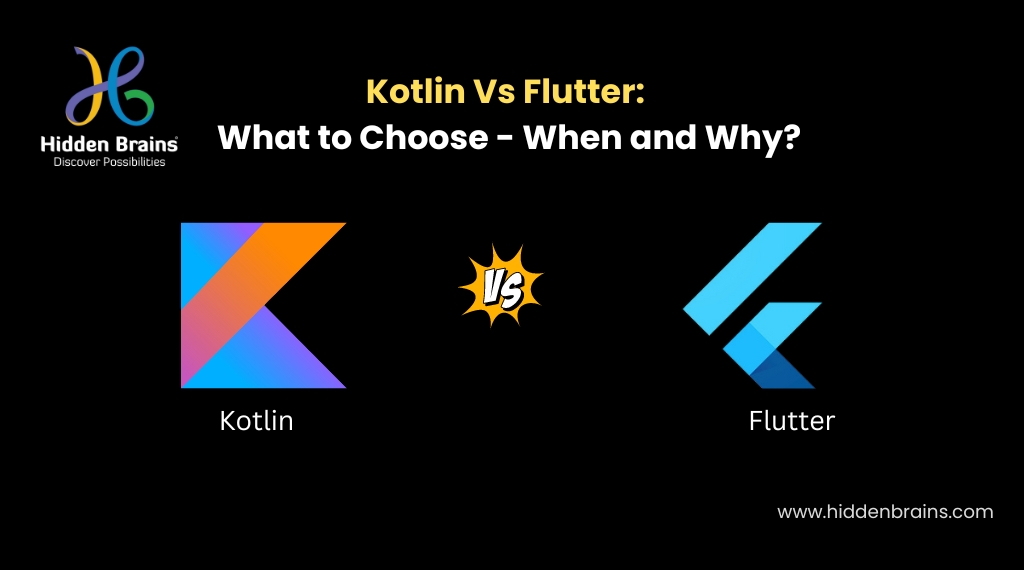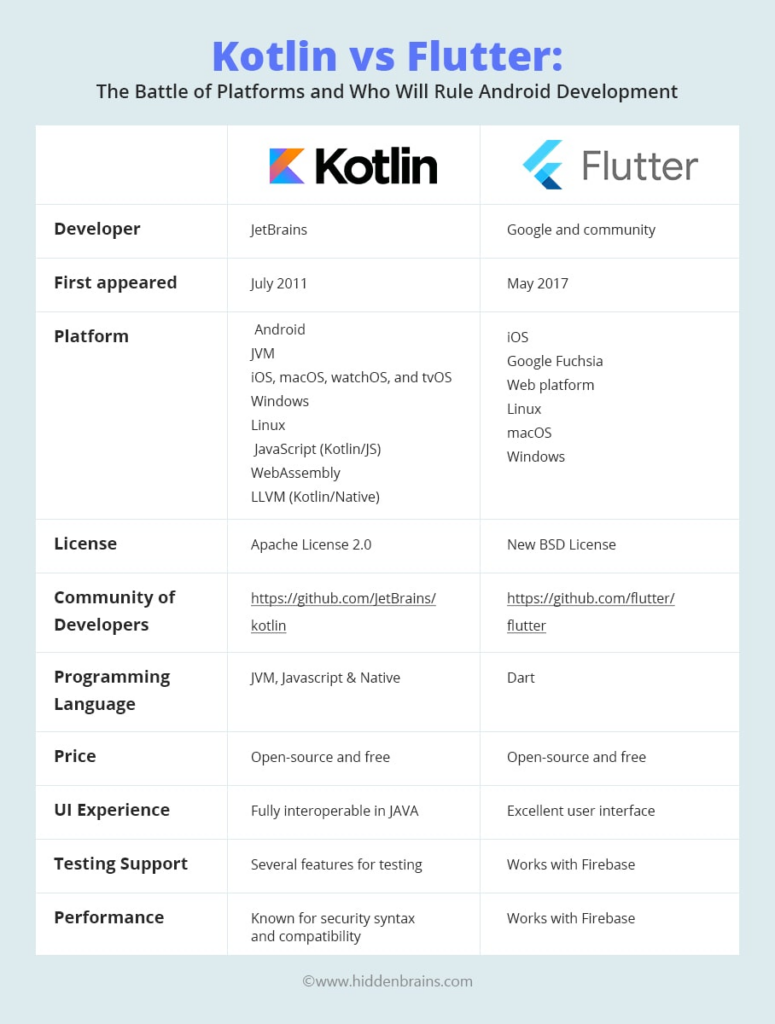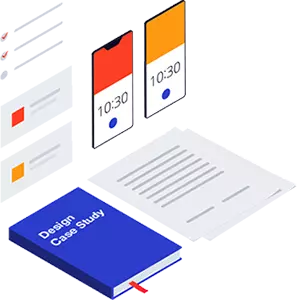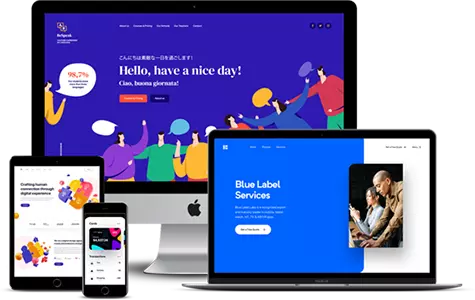Table of Contents

When there is a comparison of Kotlin Vs Flutter, making the right choice of technology is always a challenging task. Whether you are considering developing a cross-platform application or an Android app, if you are unsure about the technology then your entire efforts will be in drain.
So which is better when it’s about comparing Kotlin Vs Flutter?
As the mobile app development market is rapidly growing, it is important to choose the tech stack that is easy to learn, has single-code bases, ensures excellent performance, is easy to maintain, and can integrate with third-party tools and more.
Considering these parameters, Kotlin and Flutters arise as two of the top technologies utilized to create mobile apps. But which is better between Flutter and Kotlin is a never-ending battle.
Looking for the top mobile app development company in India? Book a 15-minute free consultation with our experts to build the best solution.
Let’s watch the quick video to know “Kotlin Vs Flutter: What to Choose?”
Kotlin Vs Flutter: What to Choose?
Kotlin Vs Flutter: Know the Basic Concept
The mobile app market will be growing. But how to succeed in this thriving market?
Well, both Kotlin and Flutter are powerful in their own way. But who is the best?
Kotlin is a programming language majorly supporting Android development, offering compatibility with Java. On the other hand, Flutter is a cross-platform framework utilizing Dart as a programming language and providing compatibility for both iOS and Android.
To make the best choice, let’s take a deeper look!
What is Kotlin?
Officially, Kotlin is a general-purpose programming language created by the JetBrains in 2011 to replace Java. However, its original release was formally introduced in 2016. The final version of Kotlin is 40% more compact than Java’s predecessor which makes the app development process faster.
Further, Kotlin ran on Java’s virtual machine which simply means Kotlin can be used where developers used Java – whether it be the backend, the web, the desktop app, or more.
So is it true to say that Kotlin is a language for all platforms?
Well, some of the tech giants have already put their trust in Kotlin like Uber, Amazon, Netflix, and more. So Kotlin’s credibility and scalability are fair enough to be trusted!

Start coding with Kotlin experts today!
Advantages and Challenges of Kotlin
Kotlin is a statistically typed programming language used by over 60% of developers but still there are reasons that 40% are not using it. So before you hire mobile app developer in India, let’s weight the pros and cons of Kotlin.
Advantages
- Kotlin is an SDK and not a framework; therefore, it is unnecessary to move the complete app to the platform. One can start working even with a single characteristic.
- Kotlin bears a resemblance to Scala and Swift, making it easy to learn and design a cross-platform app using a multi-frame.
- UI creation is not restricted in Kotlin; one can work on any aspect of the app without limitations.
Challenges
- There are fewer libraries in hand right now as Kotlin is still a fledgling. Once Date TimeLibrary comes situation will improve, App developers need to understand each platform and API to manage Kotlin better.
What is Flutter?
Introduced in 2017, Google’s Flutter offers developers a unique set of UI development toolkits for rapid app development. It empowers efficient creation across multiple platforms. Despite being young, Flutter is already trusted by 49% of developers.
It is an open-source framework developed and supported by Google. It uses Dart programming language and based on single-code-based principles and offers a wide range of features to overall enhance the app development experience.
But since it’s new, so how far it will stay in the future?
Firstly, it is a Google initiative and secondly, Flutter is already trusted by leading apps including Google Ads, Alibaba, Instagram, and more. So it is fair enough to say that it won’t be going anywhere.
Ready to take your app to the next level? Partner with the premier Flutter app development services in India. Hire us now!
Advantages and Challenges of Flutter
Flutter is already appreciated by developers but still it is at growing stage. Therefore, Flutter also has some strengths and weaknesses.
Advantages
- Operating cost and development costs are considerably lower because of native-like apps with single-based code.
- With numerous widgets, Flutter can produce customized facilities for its users.
- As Flutter assists in developing apps for both Android and iOS in a minimum period, it thus fits for MVP development.
Challenges
- The language employed, Dart is still unfamiliar to all the app developers, and this is quite a barrier.
- The framework size is vast; therefore, the apps are much more prominent in dimensions, which is detrimental in app development today.
Selecting the right platform always depends on the type of project and its fundamental requirements. Look for the right set of qualities that these platforms possess and match them with your requirements; you will have the perfect combination. So before you hire a top software development company in India, let’s get into a detailed comparison.
Kotlin Vs Flutter: A Detailed Comparison
There is no doubt that Kotlin and Flutter are young and have quickly become developer’s choice. But both have different purpose and specific for different businesses. So before you get incline for any particular technology, let’s get the battle started between Kotlin Vs Flutter.
1. Kotlin Vs Flutter: Github Stars For Popularity Evaluation
Flutter Github Rating : 160K Stars | 26.2K Fork
Kotlin Github Rating: 47k Stars | 5.6 k Fork
Considering the rating on Github rating, Flutter is clearing having a upper hand over Kotlin. However when it comes to the usage, 60% of developers prefer using Kotlin whereas 45% of developers prefer staying with Flutter.
So make a choice based on popularity won’t make a logical decision. So let’s further evaluate the other parameters as well.
2. Kotlin Vs Flutter: Performance
For any mobile app, performance is an important element. Flutter offers excellent rendering capabilities as it directly builds on machine code.
Kotlin: Known for its performance on the JVM, Kotlin compiles to bytecode, offering efficiency. Its close integration with Java allows developers to leverage Java’s performance optimizations.
Flutter: Flutter’s performance is commendable. All thanks to its compilation of native machine code. This allows for more responsive user experience, especially in graphics-intensive applications.
Winner: Flutter – for its compilation to native code, potentially offering better performance.
3. Kotlin Vs Flutter: Documentation and Learning Curve
Dart is used by 2986 developers in comparison to Java which is used by 17.1 million developers. It means, Java is more easier and familiar language than Dart. Therefore, any developer familiar with Java can use Kotlin.
Kotlin: Kotlin is considered as easy to learn, especially for those already familiar with Java. It has clear syntax and offers comprehensive documentation and a mature ecosystem for app development.
Flutter: Flutter’s documentation is robust and beginner-friendly. Its widget-based architecture simplifies UI development. The hot reload feature enhances the learning curve, enabling quick feedback.
Winner: Tie – Both Kotlin and Flutter provide excellent documentation and have relatively manageable learning curves.
4. Kotlin Vs Flutter: Platform Versatility
Flutter surpasses Kotlin in evaluating app compatibility across multiple platforms.
Kotlin: It is primarily recognized for Android development, But it is also supported by Java’s Virtual Machine, Kotlin which makes it versatile and can be used for backend, web, and other applications.
Flutter: Flutter excels in platform versatility, offering a single codebase for both iOS and Android. Its ability to extend to web and desktop development widens its application scope.
Winner: Flutter – for its seamless cross-platform development.

5. Kotlin Vs Flutter: Tools Integration Compatibility
So which technology is easy to integrate with existing solutions?
Kotlin is particularly renowned for Android development and is backed by Java’s Virtual Machine. This exhibits versatility extending beyond mobile apps. Its adaptability seamlessly extends to backend services, web applications, and various other software domains.
Flutter: Flutter has its dedicated set of tools, including the Dart SDK and Flutter DevTools, optimizing the development process for those exclusively working with Flutter.
Winner: Kotlin – for its broader compatibility with existing Java tools.
6. Kotlin Vs Flutter: Development Cost
No matter whether you are developing an MVP or enterprise-level app, the cost is the biggest constraint for businesses. Kotlin is widely used for native app development whereas Flutter can reduce the development cost by being based on single code base approach.
Kotlin: Kotlin is cost-effective for Android development, leveraging existing Java codebases. Its compatibility allows businesses to make efficient use of their resources.
Flutter: Flutter’s single codebase approach can reduce development costs, as the same code can be used for both platforms. This potentially saves time and effort during development.
Winner: Flutter – for its potential to reduce costs through a unified codebase.
7. Kotlin Vs Flutter: Trends
So when it comes to hiring the app developer in India, decide which technology is trending and in what context…
Kotlin: Kotlin has gained popularity steadily, especially in the Android development community. Its growth is consistent, and it is widely adopted by various industries.
Flutter: Flutter has seen rapid growth in adoption, propelled by its cross-platform capabilities. In just three years of span, it has become a developer’s choice of 39% to 49%. Its community is speedily expanding, and it is increasingly becoming a popular choice for mobile app development.
Winner: Flutter – for its rapid growth and adoption trends.
While both Kotlin and Flutter have their strengths Flutter has an edge. Being modern and the latest technology, Flutter outshined particularly for its performance, cross-platform versatility, and cost-effective development approach. However, the choice ultimately depends on the specific needs and priorities of the project.
Let’s wrap up the detailed discussion with this infographic…

Flutter Vs Kotlin: When To Choose What?
Are you still confused that what technology is best best suitable and when? Here is a quick overview:
Choose Flutter:
- Flutter will be an optimal option when aiming for a single codebase for both iOS and Android with a visually consistent UI.
- Select Flutter for rapid development as it offers hot reload feature and widget-based architecture.
- Go with Flutter if cross-platform efficiency and a striking user experience are top priorities.
Choose Kotlin:
- Kotlin will be an ideal option when your primary focus is native Android development.
- Opt for Kotlin if you are looking for a mature ecosystem, seamless Java integration, and a language designed for Android excellence.
- Choosing Kotlin will be a great option when your team’s expertise aligns with Java or Kotlin, ensuring a smooth transition and efficient development for Android.

Ready to elevate your app game?
Let’s craft a unified experience across platforms!Summary: Who Is The Winner?
The prime goal of this blog is to provide you a fair idea about how both Kotlin and Flutter are leading the domain. There is no winner or loser, as both technologies are powerful and enabling businesses to build highly responsive apps.
If you are still trying to understand that which will be a great choice of technology for your project, then it is worth to hire mobile app developers in India. The experts will evaluate your business needs and then help you pick the right technology. And that’s where Hidden Brains takes the entry and ensuring you the opportunity to build high-performance mobile app using the best skills.
If you have doubt or query then you can contact us!
FAQs
Kotlin and Flutter are the two most popular technologies to be consider when it comes to developing a mobile app. If you have any doubt, then you can consider this FAQs section.
Flutter Vs Kotlin – Which Is Better For Enterprise-Level Application?
Flutter excels for cross-platform uniformity, while Kotlin integrates seamlessly into Android ecosystems. The choice depends on specific project needs and existing tech investments.
Flutter Vs Kotlin – Which is Easy to Maintain?
Both Flutter and Kotlin offer features enhancing maintainability. Flutter’s hot reload aids real-time changes, while Kotlin’s concise syntax and Java compatibility contribute to code clarity and simplicity.
Which Technology is Budget Friendly Between Kotlin and Flutter?
Flutter’s single codebase reduces costs for cross-platform development. Kotlin is cost-effective for businesses with existing Java investments, leveraging prior development resources.
Among Flutter and Kotlin – Which Ensure Faster Development?
Flutter, with its hot reload and unified codebase, ensures rapid development. On the other hand, Kotlin, though efficient, may face minor delays due to platform-specific considerations.
Kotlin Vs Flutter – Which is Suitable For MVP Development?
In comparison to Kotlin, Flutter stands out for MVPs as if offers swift development across platforms. Kotlin is solid for native Android MVPs, capitalizing on its compatibility with Java for stability and maturity.
You can also check our other services:
Hire Web Developers In India, Hire App Developer In India, Hire Laravel Developers In India, Hire PHP Developers In India, Hire Flutter Developers In India, Hire React Native Developers In India, Hire Android App Developers In India, Hire iOS App Developers In India, Hire ReactJs Developers In India, Hire NodeJs Developers In India, Hire AngularJs Developers In India, Hire ASP.NET Developers In India, Software Product Development Company In India, Web Development Company In India, Angular Development Company In India, Laravel Development Company In India, iOS App Development Company In India, Android App Development Company in India









































